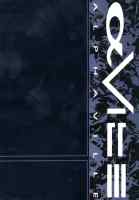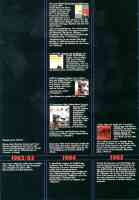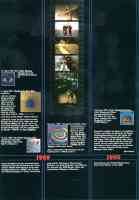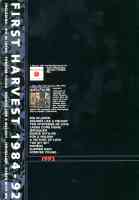 Oblivious to time schedules and pressures, the musicians of Alphaville work
away in their Lunapark recording studio, high above the roof-scape of Berlin.
Oblivious to time schedules and pressures, the musicians of Alphaville work
away in their Lunapark recording studio, high above the roof-scape of Berlin.
 Oblivious to time schedules and pressures, the musicians of Alphaville work
away in their Lunapark recording studio, high above the roof-scape of Berlin.
Oblivious to time schedules and pressures, the musicians of Alphaville work
away in their Lunapark recording studio, high above the roof-scape of Berlin.
Alphaville - a band which understands 'pop' and knows how to use it, but which has always tried to widen the boundaries of its subject matter. Creativity and imagination, loyalty to your own beliefs, recognition of utopia as tomorrow's reality - the members of Alphaville regard all these concepts to be as equally important as the high tech equipment in their "Lunapark" studio.
The "First Harvest 1984-1992" album brings the wheel full circle for Alphaville (in more than one way: years ago Alphaville took their name from the 1965 Jean Luc Godard film "Alphaville". Coincidence has it that Godard is at present shooting a revamp of the film - with Eddie Constantine playing the main role a second time around).
 Bernhard Lloyd: "We're looking back to the basis of our work. On these
pounding stones we can still stand and work today. At the same time a look
back shows that commercial success - although it is there - was never the
motor of our work. Seeing and knowing that makes one relax and be calm."
Bernhard Lloyd: "We're looking back to the basis of our work. On these
pounding stones we can still stand and work today. At the same time a look
back shows that commercial success - although it is there - was never the
motor of our work. Seeing and knowing that makes one relax and be calm."
The town of Münster in the West German region of Westfalia, where the trio first met, lies away from the usual epi-centres of pop. This enabled the group to experiment freely without any pressure. Münster was their playground, a place to be naive and experiment. On his new synthesizer Bernhard plays a tune for Marian, and in the entrance hall - "It had this tremendous echo in there" - for the chorus Marian sang the first thing that came to his mind: "Forever Young".
 Armed with the demo-tape of "Big in Japan" Alphaville had little problem
finding a record company. Released in January 1984, "Big in Japan" reached
number one spots in singles-charts of six different countries and won gold
status. "Forever Young", Alphaville's debut-album followed in September 1984,
and won the band several gold and two platinum LPs. The band is indeed a
curious, rare mixture: a German band, from the rural provinces! -an identity
that helped ensure international acclaim with fans and critics a like. In the
time to come Alphaville would go on producing and writing hit-songs without
drifting into superficiality. "It wasn't our intention," says Marian, "to
follow up 'Forever Young' with another effective but hasty shot from the hip.
We could have done that but our philosophy was and is to work quietly and
persistently on new concepts."
Armed with the demo-tape of "Big in Japan" Alphaville had little problem
finding a record company. Released in January 1984, "Big in Japan" reached
number one spots in singles-charts of six different countries and won gold
status. "Forever Young", Alphaville's debut-album followed in September 1984,
and won the band several gold and two platinum LPs. The band is indeed a
curious, rare mixture: a German band, from the rural provinces! -an identity
that helped ensure international acclaim with fans and critics a like. In the
time to come Alphaville would go on producing and writing hit-songs without
drifting into superficiality. "It wasn't our intention," says Marian, "to
follow up 'Forever Young' with another effective but hasty shot from the hip.
We could have done that but our philosophy was and is to work quietly and
persistently on new concepts."
In summer 1986, more than two years after their tremendous start, Alphaville released their second album, "afternoons in utopia". Some media hacks, accustomed to the ephemeral nature of pop, welcomed and praised the "splendid comeback". Today, we know better. The musicians of Alphaville are continuous, steady workers, but they are not being pushed into anything that isn't their belief. "afternoons in utopia" was a concept album that was years in the making. Every song is a stop-over on their way into an Arcadian paradise.
 Work on "The Breathtaking Blue", Alphaville's third album, commenced in
January 1987. Ex-Tangerine Dream musician Klaus Schulze co-produced the
album, initially intending to help out on the recording for two weeks, which
eventually turned into two years. Friends from other Berlin bands join the
recording sessions at various stages and appear as guest musicians on "The
Breathtaking Blue".
Work on "The Breathtaking Blue", Alphaville's third album, commenced in
January 1987. Ex-Tangerine Dream musician Klaus Schulze co-produced the
album, initially intending to help out on the recording for two weeks, which
eventually turned into two years. Friends from other Berlin bands join the
recording sessions at various stages and appear as guest musicians on "The
Breathtaking Blue".
With their new album, Alphaville continue on their own distinctive path. In an imaginative way the group invited internationally renowned film directory from the USA, Soviet Union, Japan, West Germany and Australia to visualize the "The Breathtaking Blue" album. Marian, Bernhard and Ricky call their project "Songlines", inspired by the late Bruce Chatwin and his book about the Australian Aborigines and their belief in singing the world into existence. The ensuing 50-minute film is a stand against the conveyor belt mentality of the pop video industry. One of its nine parts, "Middle of the Riddle", made by Christoph and Wolfgang Lauenstein, received the highest award in the world of film, an Oscar.
 At the time of starting work on "The Breathtaking Blue" - their most mature
album as all three 'Alphas' emphasize - Alphaville had already moved into
their own, new "Lunapark" recording studio. Even before that, they made sure
that their label contract, too, granted them the largest possible free space
for creative and independent work. Alphaville's contract with their record
label implies more personal risks for the band members but simultaneously
guarantees more personal and artistic freedom.
At the time of starting work on "The Breathtaking Blue" - their most mature
album as all three 'Alphas' emphasize - Alphaville had already moved into
their own, new "Lunapark" recording studio. Even before that, they made sure
that their label contract, too, granted them the largest possible free space
for creative and independent work. Alphaville's contract with their record
label implies more personal risks for the band members but simultaneously
guarantees more personal and artistic freedom.
Since last year Alphaville have been working away in their "Lunapark" studio on their fourth studio album. At the same time Marian Gold puts the chisel on his first solo recording project.
See also: